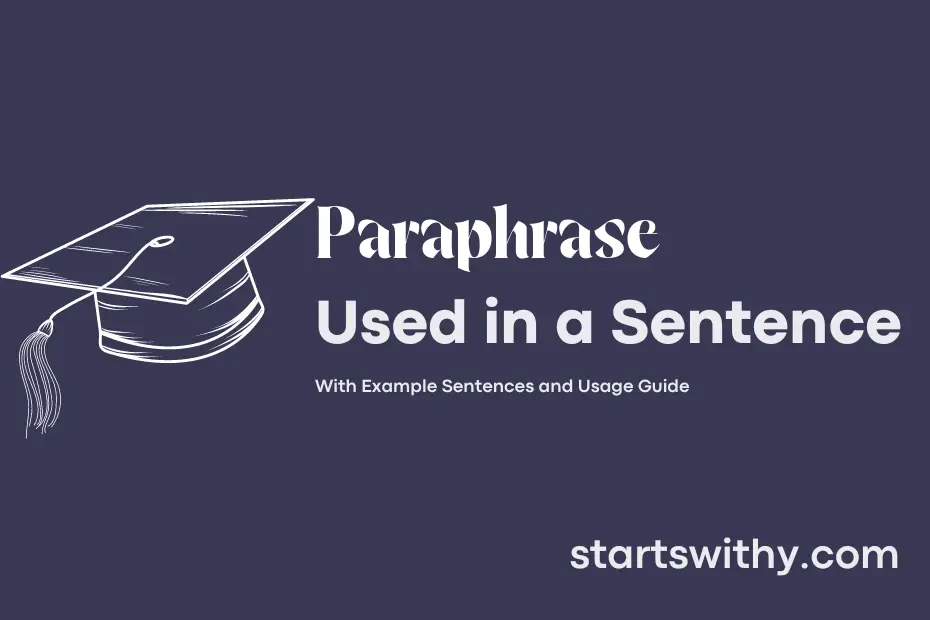Have you ever struggled to find the right words to explain something? That’s where paraphrasing comes in. Paraphrasing is the act of rephrasing or restating a text or speech in your own words while keeping the original meaning intact.
It’s a valuable skill in communication, writing, and academia. By paraphrasing, you can demonstrate your understanding of a concept or message, avoid plagiarism, and clarify complex ideas. Let’s explore the importance and techniques of paraphrasing throughout this guide.
7 Examples Of Paraphrase Used In a Sentence For Kids
- Paraphrase means to restate something in your own words.
- We can use paraphrase to understand a story better.
- When we paraphrase, we say the same thing in a different way.
- It’s important to paraphrase so we can explain things clearly.
- Let’s practice how to paraphrase sentences together.
- Paraphrase helps us remember information more easily.
- Remember to use your own words when you paraphrase.
14 Sentences with Paraphrase Examples
- Paraphrase the passage to better understand the complex concepts.
- Can you paraphrase this paragraph for me before our discussion?
- It’s important to paraphrase information in your own words to enhance your understanding.
- Make sure to paraphrase the main points of the text in your own words.
- When writing essays, it’s helpful to paraphrase information from various sources.
- Before your presentation, practice how to paraphrase key ideas effectively.
- Paraphrase the author’s argument to demonstrate your comprehension of the text.
- In academic writing, always remember to paraphrase rather than directly quote from sources.
- When studying for exams, try to paraphrase information to improve retention.
- Paraphrasing is a valuable skill that can help you convey complex ideas more clearly.
- When taking notes, it’s beneficial to paraphrase information rather than copying it verbatim.
- Can you paraphrase this research paper to summarize the key findings?
- Engaging in group discussions can help you practice how to paraphrase effectively.
- Remember to paraphrase your notes when preparing for exams to better understand the material.
How To Use Paraphrase in Sentences?
To paraphrase effectively, begin by understanding the meaning of the original text. Then, express that meaning using different words and sentence structure. Remember, the goal of paraphrasing is to rephrase the information in your own words while maintaining the original message.
Here is a step-by-step guide on how to use paraphrase in a sentence for beginners:
- Read the original text carefully and make sure you comprehend its main idea.
- Identify key points and important details that you want to rephrase.
- Start writing your paraphrase without looking at the original text to avoid unintentional plagiarism.
- Use synonyms and different sentence structures to convey the same message.
- Compare your paraphrase with the original text to ensure accuracy and relevance.
- Make necessary adjustments to your paraphrase to enhance clarity and coherence.
- Cite the original source if you are using someone else’s work to avoid plagiarism.
- Practice regularly to improve your paraphrasing skills and develop your unique writing style.
By following these steps, you can effectively use paraphrase in a sentence to convey information in a clear and concise manner. Remember, paraphrasing is a valuable skill that can help you avoid plagiarism and enhance your understanding of complex texts.
Conclusion
In summary, paraphrasing involves restating information in your own words while retaining the original meaning. This can be seen in various examples of sentences with paraphrase, where the essence of the original statement is preserved but the wording is altered to avoid plagiarism and improve understanding. Paraphrasing is a valuable skill in academic writing and communication as it demonstrates comprehension, critical thinking, and the ability to express ideas in an original way.
By practicing paraphrasing, individuals can enhance their writing skills, avoid potential issues related to plagiarism, and communicate complex concepts more effectively. Embracing paraphrasing not only fosters a deeper understanding of the material but also encourages original thinking and engagement with the content. Overall, mastering the art of paraphrasing is essential for clear and ethical communication in both academic and professional settings.



